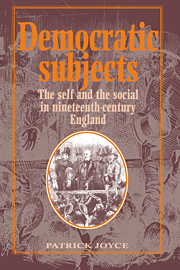Book contents
- Frontmatter
- Contents
- List of plates
- Acknowledgements
- Introduction
- Part One The sorrows of Edwin Waugh: a study in ‘working-class’ identity
- Part Two John Bright and the English people: a study in ‘middle-class’ identity
- Part Three Democratic romances: narrative as collective identity in nineteenth-century England
- 12 Narrative and history
- 13 The romance of improvement
- 14 The aesthetic framing of the social
- 15 The constitution as an English Eden
- 16 The story of the cruel Turk
- 17 Some democratic leading men, or Mr Gladstone's dream
- Appendices
- Index
12 - Narrative and history
Published online by Cambridge University Press: 10 December 2009
- Frontmatter
- Contents
- List of plates
- Acknowledgements
- Introduction
- Part One The sorrows of Edwin Waugh: a study in ‘working-class’ identity
- Part Two John Bright and the English people: a study in ‘middle-class’ identity
- Part Three Democratic romances: narrative as collective identity in nineteenth-century England
- 12 Narrative and history
- 13 The romance of improvement
- 14 The aesthetic framing of the social
- 15 The constitution as an English Eden
- 16 The story of the cruel Turk
- 17 Some democratic leading men, or Mr Gladstone's dream
- Appendices
- Index
Summary
It is ironic that historians, so much concerned with the deployment of narrative, have for the most part been so little aware of how the concept of narrative has come to have a central place in the epistemological frameworks of a whole range of disciplines, spanning the natural, as well as the human, sciences. I quote from a recent overview of narrative theory, that of Somers and Gibson, itself an attempt to appropriate this theory for sociology and a sociological history,
The expressions of this narrative reframing are broad and diverse. One aspect of many of the new works in narrative studies, however, is especially relevant to our understanding of how identities are constituted, namely the shift from a focus on representational to ontological narrativity. Philosophers of history, for example, have previously argued that narrative modes of representing knowledge (telling historical stories) were representational forms imposed by historians on the chaos of lived experience. More recently, however, scholars (political philosophers, psychologists, legal theorists, feminist theorists, social workers, organizational theorists, anthropologists, and medical sociologists) are postulating something much more substantive about narrative: namely that social life is itself storied and that narrative is an ontological condition of social life. Their research is showing us that stories guide action; that people construct identities (however multiple and changing) by locating themselves or being located within a repertoire of emplotted stories; that ‘experience’ is constituted through narratives … and that people are guided to act in certain ways, and not others, on the basis of the projections, expectations, and memories derived from a multiple but ultimately limited repertoire of available social, public and cultural narratives.
- Type
- Chapter
- Information
- Democratic SubjectsThe Self and the Social in Nineteenth-Century England, pp. 153 - 160Publisher: Cambridge University PressPrint publication year: 1994



